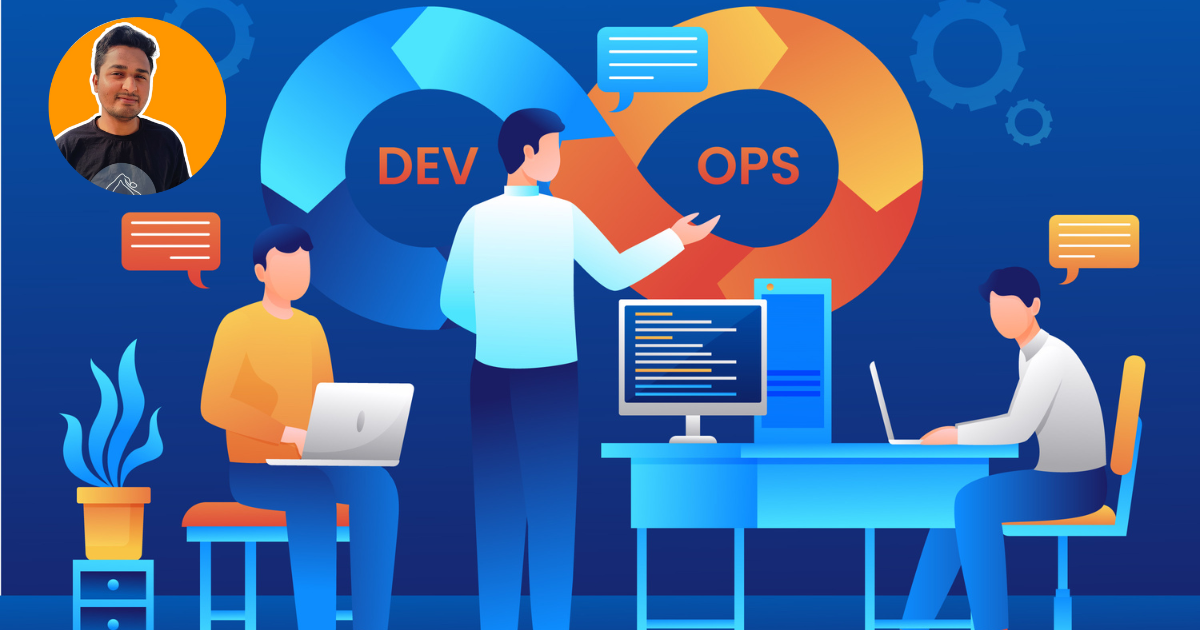Embarking on My DevOps Learning Journey
 Dhruvkumar Maisuria
Dhruvkumar MaisuriaTable of contents
- Introduction
- Why DevOps?
- DevOps Roadmap
- Creative Blog Articles
- 1. Linux
- 2. GitHub
- 3. Python for DevOps
- 4. Docker
- 5. AWS
- 6. Jenkins
- 7. DevSecOps
- 8. GitLab CI/CD
- 9. Kubernetes
- 10. Terraform
- 11. Ansible
- 12. Grafana and Prometheus
- 13. Mock Interviews
- 14. Projects
- A special shoutout to my mentor, Shubham Londhe Sir, for his invaluable guidance and support. Check out his LinkedIn profile and YouTube channel for DevOps insights.
- Thank you, Shubham Londhe Sir!
- Conclusion

Introduction
Welcome to my DevOps learning journey! I'm excited to share this adventure with you as I delve deep into the world of DevOps, a critical field that bridges the gap between development and operations, fostering collaboration, automation, and efficiency. This journey will be publicly documented, offering you a detailed DevOps roadmap and a series of creative blog articles covering a wide array of topics. Whether you're a beginner or looking to enhance your skills, this series will provide practical knowledge, hands-on examples, and valuable resources to support your growth in DevOps.
Why DevOps?
DevOps has revolutionized how software is developed, deployed, and maintained. By promoting a culture of collaboration and automation, DevOps practices help teams deliver high-quality software faster and more reliably. As businesses increasingly adopt DevOps, the demand for skilled professionals continues to rise. Learning DevOps will equip you with the skills to build, deploy, and manage robust and scalable systems, making you a valuable asset in any tech-driven organization.
DevOps Roadmap
To guide our learning journey, I've created a comprehensive DevOps roadmap that outlines the key topics and skills we'll cover. This roadmap serves as our blueprint, helping us stay organized and focused as we progress. Here's a detailed overview of the roadmap:
1. Linux
Basics and Advanced Commands: Understanding essential and advanced Linux commands for system management.
System Administration: Managing users, processes, and system resources.
Networking: Configuring and troubleshooting network settings and services.
Shell Scripting: Automating tasks using shell scripts.
2. GitHub
Version Control with Git: Mastering Git commands and workflows.
Collaboration Workflows: Effective collaboration techniques using branches, pull requests, and reviews.
3. Python for DevOps
Python Basic Commands: Understand and write the python operations.
Scripting and Automation: Writing Python scripts to automate DevOps tasks.
Integrating with DevOps Tools: Using Python to interact with APIs and DevOps tools.
4. Docker
Containerization Concepts: Understanding the basics of containerization and Docker architecture.
Building and Managing Containers: Creating Docker images and managing containers.
Docker Compose: Orchestrating multi-container applications with Docker Compose.
5. AWS
Cloud Computing Fundamentals: Overview of cloud computing and AWS core services.
Core AWS Services: Using EC2, S3, RDS, and other key AWS services.
Infrastructure as Code (IaC): Automating infrastructure provisioning with tools like AWS CloudFormation and Terraform.
6. Jenkins
Introduction to Jenkins: Setting up Jenkins and understanding its core features.
Creating CI/CD Pipelines: Building and managing CI/CD pipelines in Jenkins.
Advanced Jenkins Features: Exploring advanced Jenkins plugins and configurations.
7. DevSecOps
Integrating Security into DevOps: Best practices for embedding security into DevOps processes.
Security Tools and Techniques: Using tools like SonarQube, OWASP ZAP, and Snyk for secure development.
8. GitLab CI/CD
Setting Up GitLab CI/CD: Configuring GitLab CI/CD pipelines for automated builds and deployments.
Best Practices: Optimizing CI/CD workflows and pipeline efficiency.
9. Kubernetes
Container Orchestration: Introduction to Kubernetes and its architecture.
Managing Applications: Deploying, scaling, and managing containerized applications with Kubernetes.
Advanced Kubernetes Features: Using Helm, custom resource definitions (CRDs), and operators.
10. Terraform
Getting Started with Terraform: Basics of Terraform and its use for infrastructure as code.
Writing Terraform Configurations: Creating reusable and scalable infrastructure configurations.
Advanced Terraform Techniques: Managing state, modules, and complex infrastructure setups.
11. Ansible
Configuration Management: Basics of Ansible and configuration management principles.
Automating Infrastructure Provisioning: Writing playbooks and roles for automating infrastructure tasks.
Advanced Ansible Techniques: Using Ansible Tower, dynamic inventories, and custom modules.
12. Grafana and Prometheus
Monitoring with Prometheus: Setting up Prometheus for metrics collection and monitoring.
Visualization with Grafana: Creating dashboards and visualizing metrics with Grafana.
Integrating Grafana and Prometheus: Building comprehensive monitoring solutions with Grafana and Prometheus.
13. Mock Interviews
Preparing for DevOps Interviews: Strategies for successful DevOps interviews.
Common Interview Questions and Answers: Practice questions and model answers for DevOps roles.
14. Projects
Minor Projects: Hands-on practice with small-scale projects to reinforce learning.
Major Projects: Comprehensive projects that showcase your DevOps skills and knowledge.
Creative Blog Articles
Each topic in the roadmap will be covered in detail through a series of blog articles. These articles will include explanations, code examples, and practical use cases. Here’s a detailed look at what you can expect:
1. Linux
Linux Basics Commands - Part 1: Introduction to essential Linux commands and their usage.
System Level Commands and User Management - Part 2: Exploring system-level commands and managing users in Linux.
Networking Commands - Part 3: Detailed guide on networking commands in Linux.
Mastering Text Processing with awk, sed, and grep - Part 4: Advanced text processing techniques.
Shell Scripting Tutorial - Part 5: A beginner's guide to shell scripting with practical examples.
2. GitHub
Version Control with Git and GitHub: Basics of Git and using GitHub for version control.
Collaborative Workflows: Best practices for collaboration using GitHub.
Automating Workflows with GitHub Actions: Setting up CI/CD pipelines using GitHub Actions.
3. Python for DevOps
Scripting for Automation: Using Python scripts to automate repetitive tasks.
Integrating Python with DevOps Tools: Examples of integrating Python with various DevOps tools like Jenkins, Docker, and AWS.
4. Docker
Introduction to Docker: Understanding containerization and Docker fundamentals.
Building and Managing Containers: Step-by-step guide to creating and managing Docker containers.
Using Docker Compose for Multi-Container Applications: Setting up multi-container applications with Docker Compose.
5. AWS
AWS Fundamentals: Introduction to AWS and core services.
Building Infrastructure with AWS: Practical guide to using AWS services for infrastructure.
Infrastructure as Code with AWS: Automating AWS infrastructure provisioning using AWS CloudFormation and Terraform.
6. Jenkins
Getting Started with Jenkins: Basics of Jenkins and setting up a Jenkins server.
Creating CI/CD Pipelines: Building and managing Jenkins pipelines for continuous integration and deployment.
Advanced Jenkins Features: Exploring advanced features and plugins in Jenkins for more complex workflows.
7. DevSecOps
Introduction to DevSecOps: Integrating security practices into DevOps.
Tools and Techniques for Secure Development: Best practices and tools for secure development and deployment.
8. GitLab CI/CD
Setting Up GitLab CI/CD: Configuring GitLab CI/CD pipelines for automated builds and deployments.
Best Practices for GitLab CI/CD: Tips and tricks for effective CI/CD with GitLab.
9. Kubernetes
Kubernetes Fundamentals: Understanding Kubernetes and container orchestration.
Managing Applications with Kubernetes: Deploying and managing applications in Kubernetes.
Scaling and Monitoring with Kubernetes: Techniques for scaling and monitoring Kubernetes applications.
10. Terraform
Getting Started with Terraform: Basics of Terraform and infrastructure as code.
Writing Terraform Configurations: Creating and managing Terraform configurations for various environments.
Advanced Terraform Techniques: Using Terraform modules, managing state, and advanced configurations.
11. Ansible
Introduction to Ansible: Basics of configuration management with Ansible.
Automating Infrastructure Provisioning: Using Ansible to automate infrastructure tasks.
Advanced Ansible Playbooks: Writing advanced playbooks and roles in Ansible.
12. Grafana and Prometheus
Monitoring with Prometheus: Setting up Prometheus for monitoring and metrics collection.
Visualization with Grafana: Creating dashboards and visualizing metrics with Grafana.
Integrating Grafana and Prometheus: Combining Grafana and Prometheus for comprehensive monitoring solutions.
13. Mock Interviews
Preparing for DevOps Interviews: Tips and strategies for DevOps interviews.
Common Interview Questions and Answers: Practice questions and model answers for DevOps roles.
14. Projects
Minor Projects: Hands-on practice with small-scale projects to reinforce learning.
Major Projects: Comprehensive projects that showcase your DevOps skills and knowledge.
A special shoutout to my mentor, Shubham Londhe Sir, for his invaluable guidance and support. Check out his LinkedIn profile and YouTube channel for DevOps insights.
Thank you, Shubham Londhe Sir!
Conclusion
By following this DevOps learning journey, you'll gain a solid understanding of DevOps principles, tools, and best practices. My blog articles will provide you with practical knowledge, hands-on experience, and valuable resources to help you succeed in your DevOps career. Stay tuned for exciting content, and feel free to reach out with any questions or suggestions. Let's learn and grow together in the world of DevOps!
Thank you for joining me on this journey. Stay connected, keep learning, and let's make DevOps mastery our ultimate goal. Together, we'll explore, innovate, and achieve great things in the world of DevOps.
Subscribe to my newsletter
Read articles from Dhruvkumar Maisuria directly inside your inbox. Subscribe to the newsletter, and don't miss out.
Written by

Dhruvkumar Maisuria
Dhruvkumar Maisuria
About Me As a dedicated tech enthusiast with a passion for continuous learning, I possess a robust background in software development and network engineering. My journey in the tech world is marked by an insatiable curiosity and a drive to solve complex problems through innovative solutions. I have honed my skills across a diverse array of technologies, including Python, AWS, SQL, and Golang, and have a strong foundation in web development, API testing, and cloud computing. My hands-on experience ranges from creating sophisticated applications to optimizing network performance, underscored by a commitment to excellence and a meticulous attention to detail. In addition to my technical prowess, I am an avid advocate for knowledge sharing, regularly contributing to the tech community through blogs and open-source projects. My proactive approach to professional development is demonstrated by my ongoing exploration of advanced concepts in programming and networking, ensuring that I stay at the forefront of industry trends. My professional journey is a testament to my adaptability and eagerness to embrace new challenges, making me a valuable asset in any dynamic, forward-thinking team. Whether working on a collaborative project or independently, I bring a blend of analytical thinking, creative problem-solving, and a deep-seated passion for technology to every endeavor.